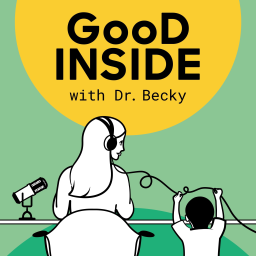
by talkingtoteens.com
Parent-teen researcher Andy Earle talks with various experts about the art and science of parenting teenagers. Find more at www.talkingtoteens.com
Language
🇺🇲
Publishing Since
10/1/2017
Email Addresses
1 available
Phone Numbers
0 available

April 27, 2025
<p>Nicole Karlis, author of Your Brain on Altruism, discusses the neuroscience behind altruism, revealing how acts of kindness impact teen brains, mental health, resilience, and lasting happiness.</p><p><strong>Full Show Notes</strong></p><p>As parents, we hope our teenagers grow up to be kind, caring, and community-oriented adults. We encourage them to volunteer, assist neighbors, or participate in community service projects, hoping it'll build character and strengthen empathy. But did you know there's actual science linking altruism to improved well-being, reduced stress, and even better health? What if building compassion wasn't just a nice extra—but a powerful tool for coping with stress, fostering mental health, and developing meaningful relationships?</p><p>Many teens face abundant pressures: academic expectations, college applications, social anxieties, and now the unprecedented rise of loneliness and technology overload. With these challenges mounting, could altruism offer a unique and surprisingly effective antidote—not just helping teens survive but thrive in today's world?</p><p>In this week's insightful conversation, we're joined by Nicole Karlis, health and science journalist and author of Your Brain on Altruism: The Power of Connection and Community During Times of Crisis. Nicole spent nearly a decade exploring the science behind altruism, kindness, and community connection. She specializes in translating compelling neuroscience into practical lessons we can apply right at home with our teens.</p><p>Nicole reveals the neuroscience underpinning the benefits of altruism, describing how selfless actions activate brain regions responsible for stress relief, emotional regulation, and meaningful fulfillment. By cultivating altruistic behaviors, Nicole argues, teens can overcome feelings of isolation and connect meaningfully with their communities—even during a loneliness epidemic.</p><p>In our conversation, Nicole sheds light on why altruism is so powerful and how parents can harness and revive this instinct in their teens to create their own "culture of caring."</p><p><strong>The Neuroscience of Altruism</strong></p><p>It turns out our brains are wired to benefit from kindness. Nicole outlines research showing that acts of generosity, kindness, and compassion trigger neural pathways linked to reward and decreased stress. Teens who practice altruism report feeling more deeply connected to others and their community, experiencing higher executive functioning, and enjoying mental health benefits.</p><p>Creating regular acts of kindness, Nicole explains, can physically change the structure of teen brains due to neuroplasticity—the brain's ability to reorganize and strengthen beneficial pathways. Over time, practicing altruism can become habitual—ultimately shaping teens into compassionate adults who experience less stress and improved overall health.</p><p>This powerful link raises the important question: how can parents best encourage altruism, especially today when teens are so busy and pressure-laden?</p><p><strong>Cultivating Kindness Without Crisis</strong></p><p>Ever notice how, after a crisis, communities come together in uniquely powerful ways? Nicole describes this phenomenon—called bounded solidarity—in regions recovering from natural disasters where neighbors join forces to help one another through difficult times. But eventually the solidarity fades. Nicole wondered if communities could maintain this spirit without needing a tragic catalyst.</p><p>In the episode, Nicole shares inspiring stories from teens who joined together after devastating wildfires. Remarkably, their initial impulse turned into a long-term community service nonprofit that raised spirits and built lasting bonds for everyone involved. She reveals that challenges and crises aren't necessary prerequisites. Families and communities can foster sustained altruism—cultivating solidarity simply through commitment and deliberate intention.</p><p>Nicole offers practical methods families can use to cultivate caring cultures, from volunteering vacations to meaningful weekend rituals. She explains why clustering multiple kindness actions on special days—rather than making kindness a daily chore—helps compassion become a joyful, healthy habit.</p><p><strong>Why Intent Matters Most</strong></p><p>Teenagers often feel pressure to volunteer to pad college applications—checking off boxes without truly feeling connected to their service activities. But Nicole emphasizes the critical role intention plays: altruism is dramatically more beneficial if teens authentically embrace their volunteering choices.</p><p>When teens genuinely want to make a difference, altruism deepens their empathy, nurtures authentic relationships, and provides real mental health benefits. Finding activities that align with your teen's natural interests enables them to genuinely experience joy and authentic connection while doing good. Nicole highlights examples, from playing bingo at senior homes to fun volunteer projects during family trips, that deeply resonate with teenagers and leave lifelong positive impacts.</p><p><strong>In the Episode…</strong></p><p>Nicole shares eye-opening insights about kindness, altruism, and their remarkable effects on teenagers. On top of the above, we discuss:</p><ul><li>How kindness helps teens counter loneliness</li><li>Techniques for fostering kindness in kids and teens</li><li>Decoding the bodily impacts of isolation and loneliness</li><li>The power of awe when witnessing acts of altruism</li><li>How volunteering boosts teens’ confidence, connections, and resumes</li></ul><p>This meaningful conversation with Nicole Karlis will forever shift how you view compassion—revealing how cultivating altruism in teenagers profoundly strengthens their brains, supports emotional resilience, and helps them thrive throughout adolescence and beyond.</p><p>If you enjoyed this episode, you can find more from Nicole at Salon.com or connect with her on Instagram @NicoleKarlis. Thanks for listening! Don't forget to share, subscribe, and tune in next week for more critical teen parenting insights.</p>

April 22, 2025
Author Jessica Slice shares insights on disability and parenting, challenging stereotypes and revealing how disabled parents demonstrate resilience and adaptability, in an interview.

April 13, 2025
<p>Sara and Morton Sherman, authors of Resonant Minds, reveal how parents can use music intentionally to build stronger connections with teens, navigate emotions, and support adolescent development.</p><p><strong>Full Show Notes</strong></p><p>In a fast-paced world flooded by digital distractions, it's sometimes difficult for parents to understand how to connect more closely with their teens. We might even wonder: Is music helping or distracting teens? They have their headphones on non-stop, but what music are they listening to, and why does it mean so much to them? Music is consistently present throughout teen culture, providing emotional refuge, identity reinforcement, and sometimes, a channel to express thoughts that might otherwise remain unspoken. But as parents, educators, and caregivers, how can we intentionally use music as a communication tool to foster emotional growth, mindfulness, and stronger family connections?</p><p>In this week's conversation, we explore how music isn't just entertainment or background noise—it's a powerful gateway to teen emotions and a key to deeper family relationships when used mindfully and intentionally.</p><p>Our guests this week, Sara Leila Sherman and Morton Sherman, authors of the new book Resonant Minds: The Transformative Power of Music, One Note at a Time, help parents explore ways to better understand and support their teens through music. Sara is a classical musician, educator, and founder of the children's concert series Mozart for Munchkins and the Little Mozart Foundation, while Morton is an esteemed educational leader renowned for visionary contributions in teaching and leadership. They're here to offer insight into the rich possibilities music provides for building emotional awareness, mindfulness, and family connections.</p><p><strong>How Music Shapes Emotions and Mindset<br></strong><br></p><p>Sara and Mort explain that teenagers spend up to four hours a day on average listening to music—but not always intentionally or thoughtfully. Music, they explain, is always working subtly to influence our emotions. Intentionally choosing music can help teens shift their emotional state, whether they want to reduce stress, lift their mood, or even find calm and concentration. Sara reveals how a simple piece of music can help teens reach a calmer mindset or even create safe emotional exploration.</p><p>Sara shares practical tips on how parents can help teens become more purposeful listeners. Asking teens to select songs as a mood-boosting family activity, for example, can create an emotional dialogue and a stronger familial bond. But this practice takes patience and openness—forcing teens to turn off their music or forbidding certain genres won’t work and can backfire quickly. The real key, the Shermans explain, is to let music serve as a platform for conversations, connections, and ultimately self-discovery.</p><p><strong>Using Music for Mindfulness and Family Harmony<br></strong><br></p><p>Sara highlights examples from her workshops, where music paired with mindful practices helps students handle anxiety or self-consciousness during challenging moments. Simple exercises, like breathing along with the rhythm of a carefully-selected piece of music, can significantly relieve tension. Additionally, choosing family music traditions or routines—like designating a specific artist or playlist to accompany certain tasks like homework, chores, or winding down—can set helpful rhythms for the entire family's daily routine.</p><p>Mort emphasizes that music isn’t just about individual wellbeing, but also about building community and understanding. He suggests that instead of shutting down teens’ interests or dismissing music they appreciate but parents might find unsettling, we can choose to engage in it as an educational and bonding opportunity. Redirecting potentially negative influences requires a careful conversational approach, built on trust, respect, and dialogue. By showing respectful curiosity about their music choices, we not only acknowledge their emerging independence, we also reinforce healthy decision-making skills.</p><p><strong>Cultivating Positive Musical Habits<br></strong><br></p><p>The Shermans encourage parents and teens alike to develop “mindful musical habits” to promote emotional regulation and balance. Sara explains how picking anchoring pieces of music—those we connect strongly with and that reliably help us feel grounded—can become positive habits in both teens' and parents' daily landscapes. Mort adds the importance of experimenting and discovering what works best for each individual family member, reminding parents that music choice is deeply personal, and what works for one may not resonate for all. Mutual respect in listening develops lifelong learning, understanding, and family closeness.</p><p>Mort also suggests playful, simple family activities, like guessing songs by tapping rhythms, sharing musical memories from each generation, or collectively creating family playlists, can extend bonding experiences. These intentional rituals turn fleeting family moments into treasured memories, layered with musical meaning that resonates far beyond adolescence.</p><p><strong>In the Episode…<br></strong><br></p><p>Whether your teen is an aspiring musician or just glued to their Spotify account, the Shermans provide practical, actionable ideas to make music a more intentional part of family life. Other topics covered include:</p><ul><li>How music can support teens who struggle socially or academically</li><li>Using musical earworms positively in your teen’s daily routine</li><li>Why parents shouldn't outright ban controversial music but engage through listening and dialogue</li><li>Emerging technologies and AI-generated personalized music—and how it impacts teens' musical consumption</li></ul><p>To learn more about Resonant Minds and find the Sherman’s recommended playlist, visit resonantminds.com. You can also directly experience Sara's interactive musical sessions at Mozart for Munchkins events if you're located in New York City. Thanks so much for tuning in this week—share, subscribe, and stay tuned for more fascinating conversations next week!</p>

Colleen O'Grady LPC, LMFT, author, speaker & C-Suite Radio

Rachel Richards

Kenneth Wilgus, Jessica Pfeiffer

Mark Gregston

Peoples Media, This Is So Awkward

Dear Media, Aliza Pressman

Janet Allison, Jennifer LW Fink

ADDitude

Dr. Becky Kennedy

Kirk Martin

Christine Koh

Understood.org, Gretchen Vierstra, Rachel Bozek

Debbie Reber
Pod Engine is not affiliated with, endorsed by, or officially connected with any of the podcasts displayed on this platform. We operate independently as a podcast discovery and analytics service.
All podcast artwork, thumbnails, and content displayed on this page are the property of their respective owners and are protected by applicable copyright laws. This includes, but is not limited to, podcast cover art, episode artwork, show descriptions, episode titles, transcripts, audio snippets, and any other content originating from the podcast creators or their licensors.
We display this content under fair use principles and/or implied license for the purpose of podcast discovery, information, and commentary. We make no claim of ownership over any podcast content, artwork, or related materials shown on this platform. All trademarks, service marks, and trade names are the property of their respective owners.
While we strive to ensure all content usage is properly authorized, if you are a rights holder and believe your content is being used inappropriately or without proper authorization, please contact us immediately at [email protected] for prompt review and appropriate action, which may include content removal or proper attribution.
By accessing and using this platform, you acknowledge and agree to respect all applicable copyright laws and intellectual property rights of content owners. Any unauthorized reproduction, distribution, or commercial use of the content displayed on this platform is strictly prohibited.
